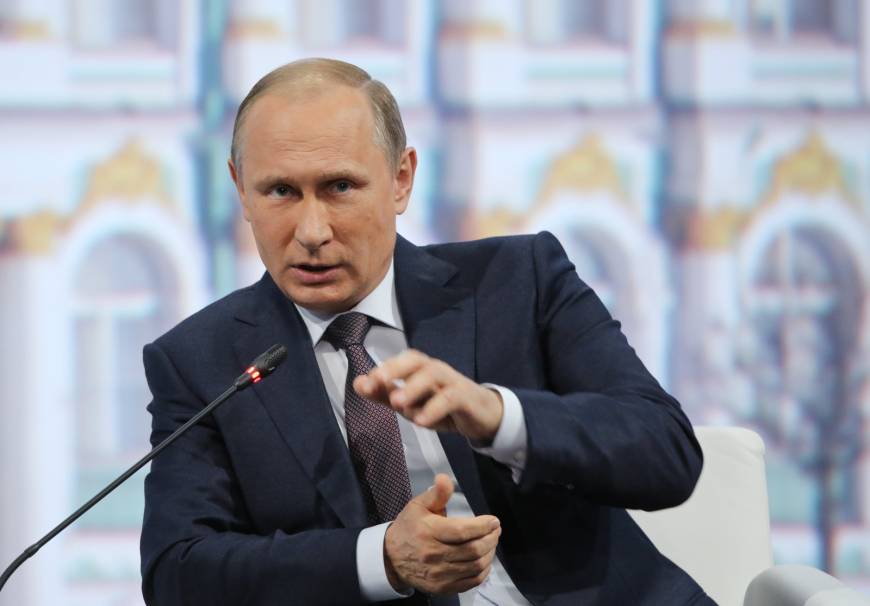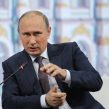
Putin’s Economic Forum: Delays, Obfuscations and Irrelevance
Publication: Eurasia Daily Monitor Volume: 12 Issue: 116
By:

The annual St. Petersburg economic forum used to be a major gathering of investors and stakeholders, who would anticipate President Vladimir Putin’s keynote speech every year for hints about where to find the richest dividends in the Russian economy. This year, however, the traditional pomp was reduced and the potential margins of profit were barely visible. Moreover, Putin’s address was entirely devoid of any meaningful content. Many mainstream Russian economists, including former finance minister Alexei Kudrin, were ready to discuss the alarming prospects of the country’s deepening stagnation, arguing that it generates an imperative for far-reaching reforms (Rbc.ru, June 19). Some orchestrated leaks foreshadowed Putin’s intention to announce significant corrections in the economic course (Vedomosti, June 17). But he opted instead to defy economic gravity and assert that no crisis was happening in Russia, which “is confidently progressing through a range of difficulties” (Newsru.com, June 19).
The attempt to talk the crisis out of existence clashes with the official statistics. Even after clever doctoring, the economic numbers show a deeper contraction than the worst case government forecasts predicted (Gazeta.ru, June 15). What is striking in this context is that nearly half of the participants in the session on a new reform strategy believed that no reforms would happen because there was no political will for such an effort (Lenta.ru, June 18). The sour mood in the crowd of bureaucratic and business elite was accentuated by the European Union’s decision to prolong the sanctions against Russia for another year. An extension to the existing sanctions was generally expected, but the decision was taken in a rather matter-of-fact way, indicating that additional sanctions are likely also under serious consideration (Kommersant, June 17). Putin’s condemnations of Western “ultimatums” and claims that the Russian economy benefits from sanctions through import substitution are just political noise for entrepreneurs. Indeed, business owners know that the real scale of the problem of under-investment is aggravated by the determined flight of domestic capital (Vedomosti, June 17).
What destroyed any residual buoyancy in the forum was the shocking—even if entirely predictable—series of arrests of Russian Federation assets by the Belgian authorities following the decision of The Hague arbitration court on awarding $50 billion in compensation to the Yukos shareholders (Slon.ru, June 19). Russian officials duly expressed outrage about this so-called politically motivated abuse of law enforcement; and Foreign Minister Sergei Lavrov threatened to reciprocate by seizing Belgian assets in Russia, knowing full well that France initiated the same procedure and other EU states will now be obliged to follow suit (Forbes.ru, June 19). Putin said nothing about this issue in his address, but later he had to evade media questions by assuring that Russia would defend its interests through a “civilized legal process” (Kremlin.ru, June 19). In fact, there are few opportunities for disputing or appealing the verdict, and the Kremlin has essentially lost the argument with Mikhail Khodorkovsky, who pointed out that the penalty would be good for Russia because the net result is the strengthening of domestic property rights (Moscow Echo, June 19).
Putin had several lengthy sessions at the St. Petersburg forum, but all his economic salesmanship failed to make a convincing impression; in contrast, his abrupt statement about deploying 40 inter-continental ballistic missiles (ICBM) produced a heavy resonance (Kommersant, June 17). The number in itself is far from impressive (he had actually promised 50 missiles half a year ago), but in the context of escalating military tensions and risky incidents with air intercepts, the habitual strategic bravado turns into irresponsible saber-rattling (Ezhednevny Zhurnal, June 19). Russia has invested heavily in the modernization of its ageing strategic arsenal, and in the situation of deepening economic crisis, the Kremlin is eager to exploit opportunities for gaining any political dividends from this investment. It seems, Putin cannot believe that such opportunities are in fact non-existent. And all his statements about Russian weapons systems targeting the newly-deployed US military forces in Europe only add to the growing understanding among North Atlantic Treaty Organization (NATO) allies of the reality of the threat emanating from Russia (Rbc.ru, June 17). Nuclear bluffs cannot be ignored when they are accompanied by the progressing militarization of the Kaliningrad exclave and with the statements of General Vladimir Shamanov—the maverick commander of the Airborne troops—about ten battalions being ready for rapid deployment outside Russia’s borders (Newsru.com, June 18).
While Moscow’s demonstrations and provocations are concentrated in the Baltic theater, the main focus of Russian pressure is still Ukraine. Putin claims commitment to the Minsk agreements, but his reiterated accusations against US interference in and manipulation of the Ukraine crisis prove that he continues to see the local clashes around Donetsk as a battlefield in the global clash for reconstituting the world order (Kommersant, June 20). Compromises and ceasefires in this non-negotiable confrontation can be only temporary, and dividing Ukraine along the present trench-lines would leave Russia with the losing proposition of having to support a “rump-Novorossiya” (Nezavisimaya Gazeta, June 18). The desperately high-profile St. Petersburg forum was quite possibly Putin’s last chance to turn from the war path toward economic reforms (Gazeta.ru, June 19). Yet, his serious misinterpretation of the economic situation tells Kudrin and every potential investor—among which China was present prominently, if less than enthusiastically—that the very idea of reforms is firmly rejected as incompatible with regime survival (Novaya Gazeta, June 19).
Putin may think that he can continue temporizing. But in reality this avoidance of decision-making makes him irrelevant for both the developing economic crisis and the escalating “hybrid war.” The Russian economy has gained such dynamism on its downward trajectory that it no longer takes an actual drop in oil prices to push it into a free-fall; rather, the same negative trend can be sparked by an awkward counter-measure by Moscow against another twist in Western sanctions. The war also can run away from the bombastic commander-in-chief, who has evidently lost any sense of direction and lives in fear of a “color revolution”—against which nuclear weapons give no protection. His courtiers have started pulling in different directions, all while “protecting” him from bad news. But for every entrepreneur who needs protection from predatory security services personnel (siloviki), for every bureaucrat worried about the confiscation of his or her ill-gained assets, and for every warlord looking for an outlet for his pent-up frustration with the status quo, procrastination becomes unacceptable. Putin is set to discover that high approval ratings mean something only in democracies.




